| Cholo | |
|---|---|
 Theatrical poster | |
| Directed by | Bernardo Batievsky |
Release date |
|
| Country | Peru |
Cholo is a Peruvian film from 1972 directed by Bernardo Batievsky that tells the story of the Peruvian soccer player Hugo Sotil. [1]
| Cholo | |
|---|---|
 Theatrical poster | |
| Directed by | Bernardo Batievsky |
Release date |
|
| Country | Peru |
Cholo is a Peruvian film from 1972 directed by Bernardo Batievsky that tells the story of the Peruvian soccer player Hugo Sotil. [1]
A young provincial painter migrates to Lima, where he finds a hostile and racist city. His soccer ability makes him reach sporting fame by traveling to several European countries. [2]
After surviving a heart attack in the early 1970s, Batievsky began writing and later directing a film about soccer starring the successful soccer player Hugo Sotil. The film was released on May 18, 1972 in fifteen theaters in Lima. [3] A week after its release, the director had the film removed from the billboard after receiving negative reviews. [4]
The music was in charge of the Peruvian group El Polen. [4]
Andrea Franco Batievsky, the director's granddaughter, oversaw the restoration process of Cholo and Mirage at the UCLA Film & Television Archive. [4] [5]
Peruvian culture is the gradual blending of Amerindian cultures with European and African ethnic groups. The ethnic diversity and rugged geography of Peru allowed diverse traditions and customs to co-exist. Peruvian culture has been deeply influenced by Native culture, Spanish culture, and African culture. Other minor influences on their culture are Chinese, Japanese, and other European peoples.

The Peru national football team represents Peru in men's international football. The national team has been organised, since 1927, by the Peruvian Football Federation (FPF). The FPF constitutes one of the ten members of FIFA's South American Football Confederation (CONMEBOL). Peru has won the Copa América twice, and has qualified for the FIFA World Cup five times ; the team also participated in the 1936 Olympic football competition and has reached the semi-finals of the CONCACAF Gold Cup. The team plays most of its home matches at the Estadio Nacional in Lima, the country's capital.
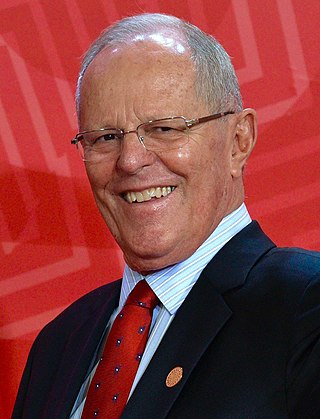
Pedro Pablo Kuczynski Godard, also known simply as PPK, is a Peruvian economist, public administrator, and former politician who served as the 59th President of Peru from 2016 to 2018. He served as Prime Minister of Peru and as Minister of Economy and Finance during the presidency of Alejandro Toledo. Kuczynski resigned from the presidency on 23 March 2018, following a successful impeachment vote and days before a probable conviction vote. Since 10 April 2019 he has been in pretrial detention, due to an ongoing investigation on corruption, money laundering, and connections to Odebrecht, a public works company accused of paying bribes.

Club Centro Deportivo Municipal, commonly known as Deportivo Municipal, is a Peruvian football club based in Lima, Peru. They are among Peru's most recognizable clubs and enjoy considerable popularity. The bulk of their success was won a few years after the club was founded in 1935. The club was a top-flight contender during this period and won four Primera División titles. The club suffered relegation three times in their history: 1967, 2000, and 2007. They have also been champions of the Segunda División on three occasions: 1968, 2006, and 2014, granting them promotion to the first division. In 2014, they won the Segunda División and they currently compete in the Primera División Peruana.

While the Peruvian film industry has not been nearly as prolific as that of some other Latin American countries, such as Mexico or Argentina, some Peruvian movies produced enjoyed regional success. Historically, the cinema of Peru began in Iquitos in 1932 by Antonio Wong Rengifo because of the rubber boom and the intense arrival of foreigners with technology to the city, and thus continued an extensive, unique filmography, with a different style than the films made in the capital, Lima.

George Patrick Forsyth Sommer is a Peruvian politician and former international footballer.

Hugo Alejandro Sotil Yerén is a Peruvian former professional football player. Nicknamed El Cholo, he played as a striker or midfielder. Together with Teófilo Cubillas and Héctor Chumpitaz, he was one of Peru's most recognized football players of the 1970s. He also was a popular player in Peru, and a biopic on his life was released in that decade. He was a member of the Peruvian team that won the 1975 Copa América and reached the quarterfinals in Mexico 1970 and Argentina 1978.
Football is the most popular sport in Peru. Football/soccer in Peru was introduced by British immigrants, Peruvians returning from Great Britain, and by English sailors in the later half of the 19th century during their frequent stops at the port of Callao, which at that point was considered one of the most important ports of the Pacific Ocean. According to the work entitled La Difusión del Fútbol en Lima, during the last decade of the 19th century, records show that sailors were known to practice sports such as football/soccer and played against teams made up of Englishmen, Peruvians, or a mix between Englishmen and Peruvians.
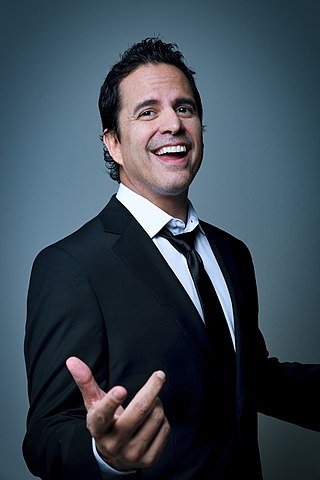
Jaime Cuadra is a Peruvian music producer, marketing specialist, singer, and composer. He produced three songs heard in the James Bond movie Quantum of Solace, and is currently Peruvian Cultural Ambassador.
The history of the Peru national football team dates back to the late 19th century, when English sailors and Peruvian travelers returning from England introduced the sport into Peru. It would take the early 20th century, in the year 1927, for Peru to finally create their first official national football team. Till the date, Peru has participated in five editions of the FIFA World Cup, its best results being the quarterfinals reached in 1970 and 1978, while in South America, it has been champion of the Copa América in 1939 and 1975.
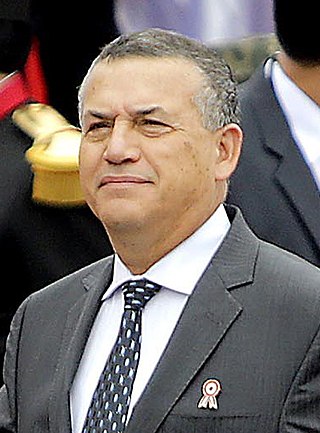
Daniel Belizario Urresti Elera is a Peruvian retired army general and politician who served as Minister of the Interior in the administration of President Ollanta Humala from 2014 to 2015, and as a Congressman representing Lima from 2020 to 2021. He is currently serving a sentence of twelve years in prison for the murder of journalist Hugo Bustíos.
This article lists events from the year 1972 in Peru.

The Seal: Number 10 from the Street is a 2020 Peruvian biographical drama film based on the life of soccer player Jefferson Farfán, produced by Lfante Films and distributed by New Century Films, the Peruvian affiliate of Warner Bros. in Peru. It is directed by Martin Casapía Casanova and written by Argentine screenwriters Güido Simonetti and Viviana Negro. It will star Jean Franco Sánchez, Juan Carlos Rey de Castro, Eva Ayllón, Anaí Padilla and Ramón García. The film narrates the life of the soccer player from his childhood on his professional path in the sport until the prelude to the 2018 FIFA World Cup.

Viejos amigos is a 2014 Peruvian comedy film directed by Fernando Villarán Luján and written by Villarán and Gonzalo Ladines. It stars Ricardo Blume, Carlos Gassols and Enrique Victoria, and antagonizes Teddy Guzmán.

Calichín is a 2016 Peruvian sports comedy film directed by Ricardo Maldonado and written by César de María. It is starring Aldo Miyashiro. It premiered on November 10, 2016 in Peruvian theaters. It can be seen on the Prime Video platform.

The Restoration is a 2020 Peruvian comedy film written and directed by Alonso Llosa in his directorial debut. It stars Paul Vega, Atilia Boschetti, Delfina Paredes, Pietro Sibille and Muki Sabogal.
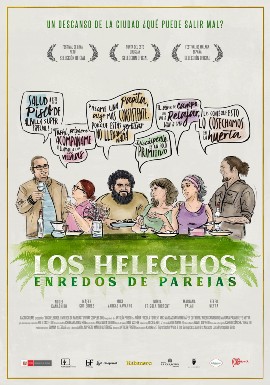
What Couples Do is a 2018 Peruvian comedy-drama film directed by Antolín Prieto and written by Prieto & Fernanda Gutiérrez. The film uses the improvisation technique commonly seen in the theater, making it the first Peruvian film to use it. It stars Nuria Frigola Torrent, Miguel Vargas, Pedro Kanashiro, Fernanda Gutierrez, Fernando Neyra, Mariana Palau and Pold Gastello.

The Last Hour is a 2017 Peruvian crime drama thriller film written and directed by Eduardo Mendoza de Echave. It stars Pietro Sibille & Nidia Bermejo. It is based on real events and set at the beginning of the 1990s, a time of terrorism in Peru, specifically during Operation Victoria, which led to the capture of the terrorist leader Abimael Guzmán.
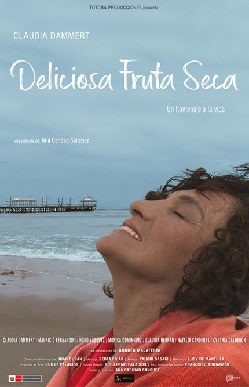
Deliciosa fruta seca is a 2017 Peruvian drama film written and directed by Ana Caridad Sanchez in her directorial debut. Starring Claudia Dammert. The film is proposed as "a tribute to the marinera, to women and to the conquest of freedom."